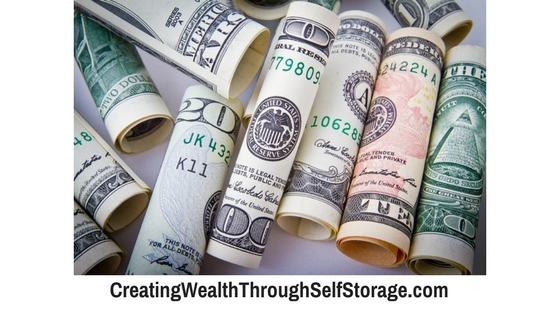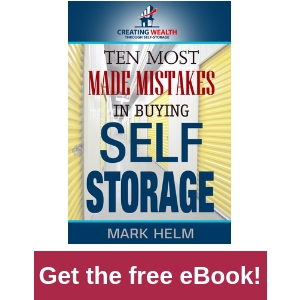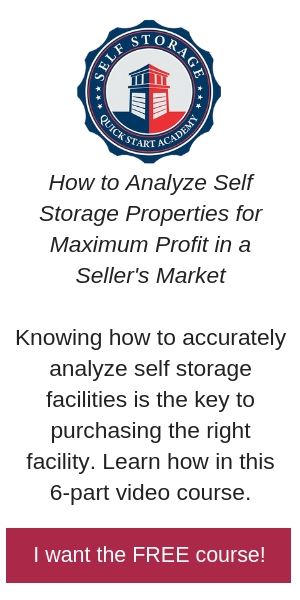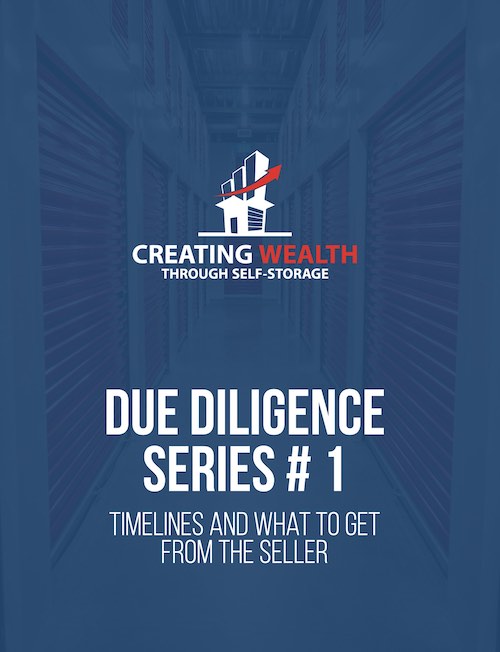Welcome to week four of the Self Storage Finances series.
Here are the three statistics we have been discussing.
- 90% of all business fail within 10 years.
- The average swing from the bottom of an economic cycle to the top is ten years.
- 90% of all business owners don’t read, or don’t know how to read a financial statement.
Warren Buffett says “The language of business is accounting”.
Accounting is a weird language. I have spent some time, energy, and money learning how to translate that language into something I can understand.
I have figured out there are, or should be, three scorecards. I call them Scorecard 1, 2 and 3. The accountants, who I call the Scorekeepers in the game of business, call them the Balance Sheet, P&L or Income Statement, and Cash Flow Statement.
The funny thing is I have never received a Cash Flow Statement from an accountant.
To get to where we are now in this series, you’ll need to have read the first three episodes. You can find the first one HERE (episodes 115, 116, & 117).
Scorecard 1 and 2 are theories. Scorecard 3 is a fact. Profit is a theory. Cash is a fact. You can’t spend profits or pay bills with profits. Try paying your property taxes with retained earnings.
You can only pay with cash.
Scorecard 3 measures three types of cash in any given time period.
The first type of cash is “Operating Cash”.
This is cash that is earned in a time period by rent or sales. It can also come from someone paying you what they owed from another time period – you collect on an IOU. (Scorekeepers call that A/R or Accounts Receivable.
You can spend operating cash by paying bills due in that time period or you giving an IOU to yourself for a bill. (Scorekeepers call that A/P or Account Payable).
Scorecard 3 also measures the second type of cash, “Investment Cash.”
Investment cash can be made by selling some of the Things and Stuff on Scorecard 1. Specifically, what the accountants call PP&E (property, plant, and equipment). It can also be spending Investment Cash by buying PP&E during that time period.
The third type of cash is “Financing Cash”.
Financing Cash can be made by borrowing from a bank or raising cash from investors. It can be spent by paying down a loan or paying back investors (called by Scorekeepers paying a “dividend”).
Scorecard 3 looks like this:
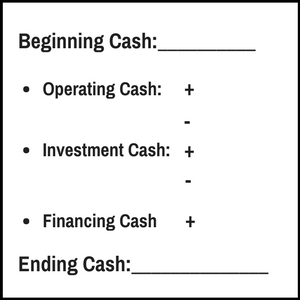
This Scorecard is like a movie. It is the movie of what happened to your cash over a specific time period.
Now, given that cash is the most important thing for a business owner, don’t you think it would be the most important Scorecard for you? I do.
You see the scorekeepers are not that interested in your cash. You are. They are interested in your taxes and you pay taxes on profits, not cash. But as a business owner, you can’t make informed decisions on profits like you can on cash. I thought you could for years, but you really need to know your cash position more than your profit position.
Yes, it is important to know your profit position to design specific tax strategies to reduce your tax liability. But that presupposes you are still in business by knowing your cash position.
Remember all cash is not equal. What cash is more important here?
Operating cash.
If your operating cash is not increasing, your company isn’t going to last. Sure there may be spurts during fast growth periods where your profits are rising faster than your cash. But in general, your cash should be growing faster than profits. (Because Scorekeepers have this thing called Depreciation that again isn’t real. It’s a theory and it helps keep profits down for taxes).
Now you can put other kinds of cash in besides Operating Cash to keep things going. In the past, I have used all three in any given year.
- You can put in your savings.
- You can sell something to generate cash (that would be selling a PP&E or generating Investment Cash).
- Or you can raise more money from investors or a bank (generate cash from Financing Cash).
But if your operating cash isn’t growing as a general rule, your business will not survive.
People have done some really funny things with their scorecards, and unless you read all three, I’m not sure how you know what’s going on exactly. I guess for an accountant, Scorecards 1 and 2 (i.e. Balance Sheet & P&L) are enough to deduce cash positions, but I’m not an accountant.
Even the smartest minds in the world have a hard time only looking at Scorecard 1 & 2. Let me give you some examples.
Who are the smartest financial minds on the planet? How about the Wall Street gang and financial planners? You would think they know about the language of business, right?
Let’s look at a publicly traded company and the brightest financial minds on the planet. Let’s look at a real live example. This is a dramatic one, but it happens all the time, every day. This is why I never, never give my money to them. If I invest in anything other than self storage or real estate (something I know a little about), I put my money in Index Funds. I would never ever give my money to a “Financially Smart Person”.
(If you haven’t noticed now, I am off self storage as the subject and have stepped on a soap box. Please indulge. I rarely get to rant and have anyone care what I have to say).
Let me give you that example.
Yes, this company has an extra couple of zeroes more than our normal self storage business might, but the premise is the same. Three scorecards and all that.
We’re looking at the time period between 1999 and 2001.
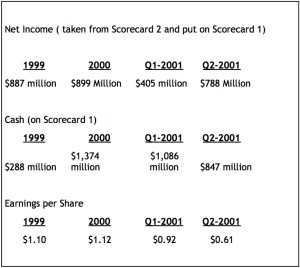
I know earnings per share isn’t a thing we deal with in self storage (unless you are a REIT).
But what do you think of this company from looking at the numbers? You would buy it, right? The smartest people on the planet did. The people you give your money to invest did.
Let’s see what they said about it:
March 12, 2001- “Strong Buy” – Lehman Brothers – $61.27 per share
March 21, 2001 – “Near term Buy” – Bear Sterns – $55.89
March 29,2001 – “Recommended” – Goldman Sachs – $55.31
June 8, 2001 – “Attractive” – Bear Sterns – $51.15
June 15, 2001 – “Buy” – JP Morgan – $47.26
August 15, 2001 – “Strong Buy” – Bank of America – $40.25
September 6, 2001 – “Buy” – Sanders Norris – $30.49
October 3, 2001 – “Buy” – AG Elton – $33.10
October 5, 2001 – Strong Buy” – First Albany – $31.73
October 9, 2001 – “Long Term Buy” – Merrill Lynch – $31.39
October 24, 2001 – “Long Term Buy” – JP Morgan – $16.41
October 25, 2001 – “Market Perform” – Bank of America – $16.35
November 1, 2001 – “Neutral” – Merrill Lynch – $11.99
Nov. 21, 2001 – “Hold” – Goldman Sachs – .61
December 22, 2001 – $0
December 2, 2001 Enron files Bankruptcy.
The smartest financial minds on the planet! The value of the company went from $61.27 per share all the way down to $16.35 before there was even a pause to begin thinking about the company.
I guess they thought there was a “sale” going on.
The rest of the story:
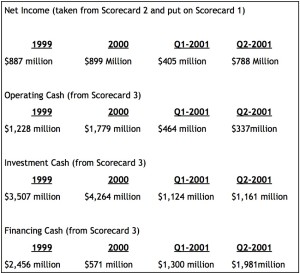
If anyone had been looking, they could see that the company was not turning profits into operating cash. Enron (or any company for that matter) can only pay their bills with operating cash, not with net income.
The net income, or profits was coming from Investment & Financing Cash. An unsustainable model.
If your self storage business looks like this – you are having to use other types of cash than Operating Cash to keep going – it’s in trouble.
I know real estate is more capital intensive and will have a larger percentage of Financing Cash as a percentage compared to assets than a non-real estate company. But after you are up and stabilized, if your operating cash isn’t growing faster than your profits, you are going backwards.
So your business need to be growing Operating Cash every year. EACH YEAR YOUR OPERATING CASH SHOULD BE GROWING FASTER THAN PROFITS. We will explain why and close this series next week.
Between now and next week, see if you can determine how much Operating Cash your facility is generating per month and per year.
If you can keep your eye on that, you will be part of the 10% of companies that beat the odds.
You will Create “True Wealth” Through Self Storage.
